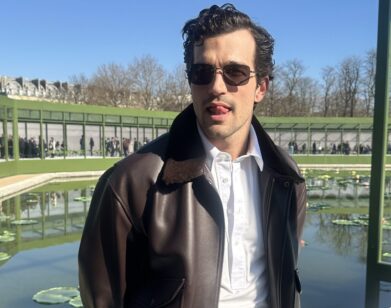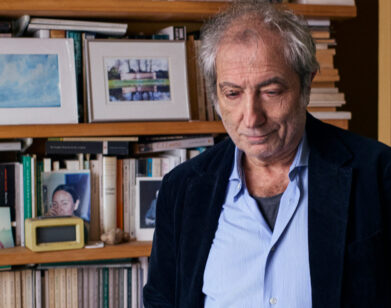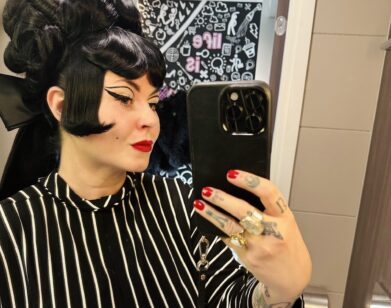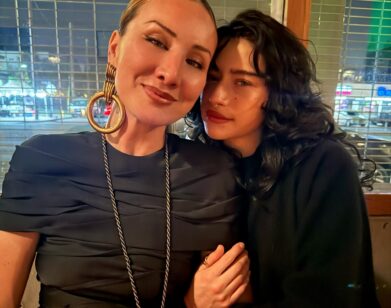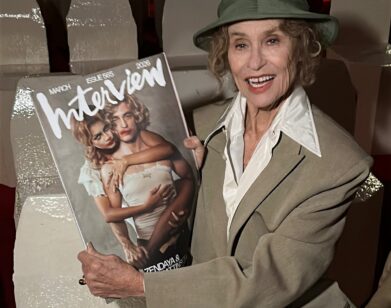What Alice Feiring Bottles Up
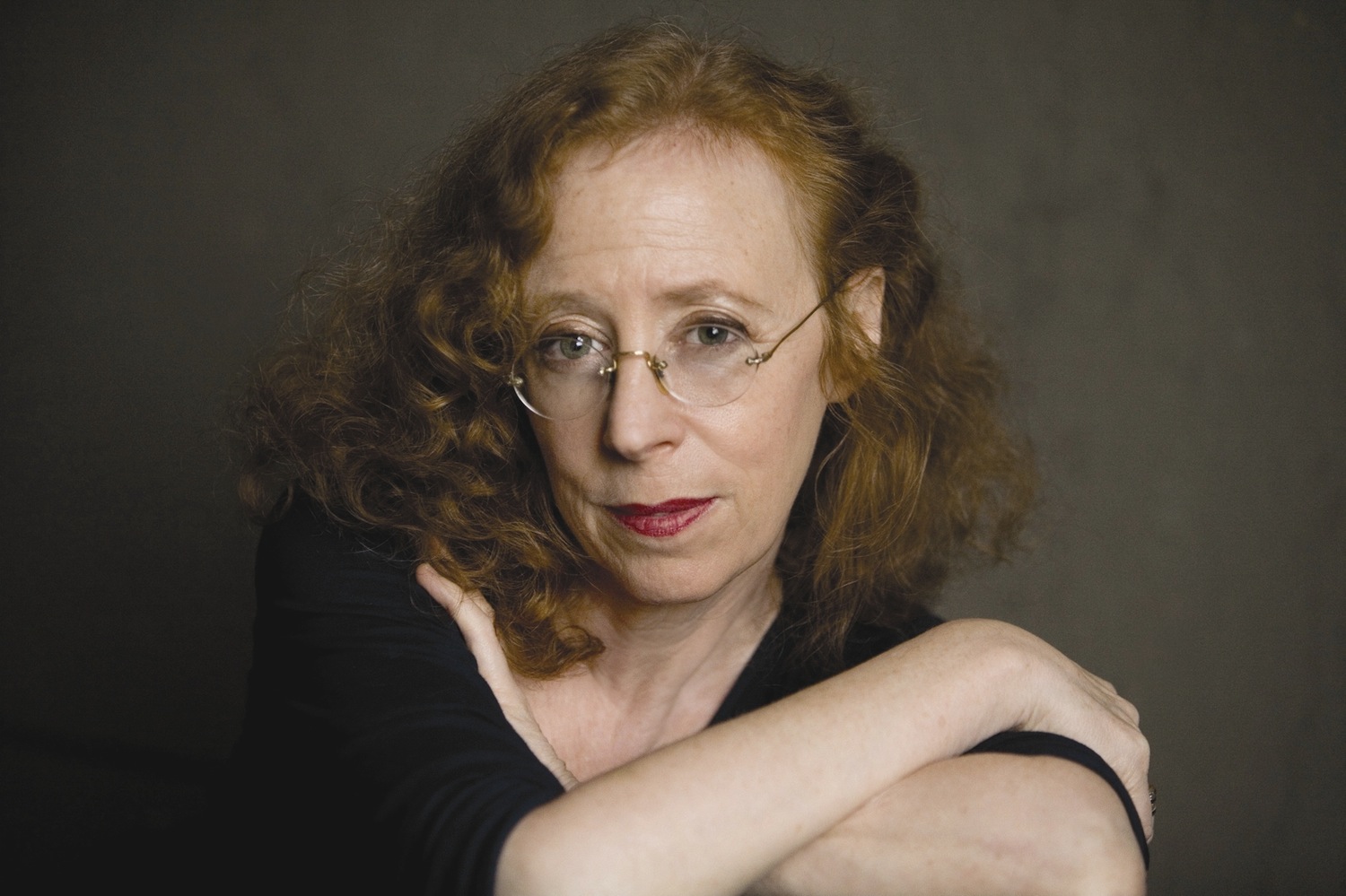
ALICE FEIRING. PHOTO COURTESY OF ANDREW FRENCH
In vino veritas: in wine, there is truth. At least that’s the case for Alice Feiring, the internationally-known, redheaded sommelier, whose memoir, Naked Wine: Letting Grapes Do What Comes Naturally (Da Capo Press), is a compelling mix of revealing first-person narrative and journalistic exploration of the people and places behind the natural wine movement. Poetic prose and a mission to discover bold new wines spirit Feiring from downtown New York to France, Italy, and California.
Mixed with memories of drinking with famous and often nutty all-natural winemakers is the author’s exhaustive knowledge of vineyards, soil, texture and taste. Studying the organic and agricultural movement, Feiring saw 20 bottles uncorked with a shoe, made friends with a boy who sold his tractor for an ox to plow his soil instead, and brewed her own batch of booze—with some surprising results. We talked with Feiring about getting drunk at a young age, her influence on Frank Bruni, how naked wine can actually get, and why her love for the bottle is a lifelong affair.
YOUNG: What’s your personal attraction to wine? How did it all start?
FEIRING: I grew up drinking it, ever since I was in diapers, the Manischewitz-and-seltzer stuff. Then when I went to college, I just found myself drawn to it. I started buying some Rieslings and Bordeaux, because they were like, two or three dollars a bottle. There was one time me and my college roommate, Lynn, went up to the Boston Commons with a bottle of Zinfandel, and it tasted disgusting, but it was a real wine moment.
YOUNG: What’s a real wine moment?
FEIRING: I remember thinking it tasted and smelled like gasoline. It was identifiably a reaction, the first strong reaction that I remember having to wine. And then in graduate school, I had a roommate who was in the wine business, and there were wine tastings at our apartment twice a week. I had never wanted to learn about wine, but I started speed-tasting my way through to get to the better wines first. I wanted to drink and I wanted to get there before other people discovered it. And then somehow, after two years, I’d look at a wine list and know what I was looking at.
YOUNG: When you said you grew up drinking; what was that like?
FEIRING: Well, just on Friday and Saturday nights.
YOUNG: So you were in diapers, but only allowed wine on Fridays and Saturdays?
FEIRING: [laughs] It was Shabbos. I was raised an Orthodox Jew. I remember being drunk at five.
YOUNG: What was that like?
FEIRING: I remember it was Friday night and I got really, really, really giddy. Then I started kicking my feet as if I were a baby. And I remember thinking, this is really uncomfortable and I didn’t like it.
YOUNG: What was your parents’ reaction to that?
FEIRING: I think they were so unaccustomed to alcohol, they just didn’t know what the hell was going on. It was a moment I kept to myself.
YOUNG: So neither of your parents were big drinkers?
FEIRING: My father became one; my mother never was.
YOUNG: How did you meet Frank Bruni, and how did you change his mind about wine?
FEIRING: I met Frank in Italy. We have a really good mutual friend. Frank at the time was the wine correspondent in Italy for the Times. And I kept on hearing about “Frank, Frank, Frank,” and our friend knew he was coming to New York to be the dining critic, but she didn’t tell me. So that night, I chose one bottle and Frank choose another bottle, and I saw that he chose a pretty modern Brunello, and I chose something from the north of Italy, which was as natural as I could get it there. And I could tell by the way he was curious about my wine that he just wasn’t exposed to the right stuff. So when I found out he was coming to New York, I made it my mission to educate him. [laughs] Not really educate him, I felt like I was on some sort of subversive mission.
YOUNG: Do you love when you see someone’s reaction to an amazing wine, when you can bring that to them?
FEIRING: Certainly. Once you get that reaction and you also happen to be attracted to somebody, it’s kind of really powerful. It’s like loving the same literature, the same music. I don’t know if I could be really intimate with somebody who had a very strong love for big, California Cabernets. I just don’t think it could happen. That would be like falling in love with a right-wing Baptist.
YOUNG: What is naked wine? Do you have to get undressed for it?
FEIRING: I understand there are some wine tastings where you are actually naked. But you can thoroughly enjoy naked wine with total coverage. You really don’t need to get naked.
YOUNG: That’s a relief. So what is naked wine?
FEIRING: It’s nothing added, nothing taken away. It’s transparent and vulnerable. It’s not armored, or bolstered with other ingredients like hyper-preservatives. It’s not thoroughly controlled. It’s wine with abandon.
YOUNG: Can you tell me about some of the places you’ve been, and the wine and people you found there?
FEIRING: I’m happiest when I travel. I’m really lucky to land in Paris a lot. Lately when I’m traveling on a wine story and spend too much time in a city away from vines, I get very anxious. I am happiest when I’m traipsing through the vines. Seeing how people relate to their agriculture is really important. That may sound boring, but to me it’s extremely sexy.
YOUNG: How do you travel the world, drinking professionally, without turning into a major lush? Or are you a lush?
FEIRING: No, I’m not, for the very same reason I never turned into a drug addict: I need to get up in the morning and write. That’s the overriding thing; I need to be really productive. I also hate to make a fool of myself in front of other people, so that combined with extreme self-consciousness. There are also a lot of wines to taste. If I’m really drunk, I’m going to miss the actual being there with them. Though I’m not saying it doesn’t happen from time to time.
YOUNG: You made your own wine, right?
FEIRING: I did make my own wine.
YOUNG: How did that go?
FEIRING: [laughs] Well, that was an adventure. I don’t know whether it was beginner’s luck, but I actually tasted it the other night, and it was quite good. The most exciting thing about making wine for me was that I got to stomp on it—I got to jump in every day.
YOUNG: What did it end up tasting like?
FEIRING: More savory than fruit. It kind of had crushed oregano on the bottom of some cherry. It was very true to the grape and almost had this Italian flavor.
YOUNG: What’s the driving force? What’s the thing that keeps pulling you back to wine?
FEIRING: For me, wine is where culture, nature, history, man and art come together in a bottle. There’s nothing else like it.
NAKED WINE IS OUT TOMORROW. FOR MORE ON ALICE FEIRING, VISIT HER WEBSITE.

